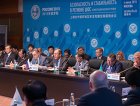Regional security, SCO expansion discussed in Moscow at the high-level conference Security and Stability in the SCO Region
Opening the conference, Russian Minister of Foreign Affairs Sergei Lavrov said that the situation in the world is growing more complex.
"The objective emergence of a polycentric world order has been accompanied by the escalation of existing conflicts and the outbreak of new ones, less focus on seeking compromise and mutual understanding, and more confrontational approaches," he said.
"The attempts by certain countries to impose their model of a world order, and use different forms of political, economic and information pressure to control internal political processes in sovereign states from the outside, while ignoring their national, historical and civilisational specifics, are dangerously destabilising," Mr Lavrov said, adding that he hoped that the results of the conference would serve as a good foundation for deepening the wide-ranging practical cooperation between SCO countries, with the participation of interested states and international organisations.
"China's basic approach is that improving the economic situation is the dominant theme of the times and meets the aspirations of the people," Chinese Foreign Minister Wang Yi said. "However, based on factors both at home and abroad, all countries in the region feel the growing pressure and the threat to stable development and security. The growing terrorist threat in Afghanistan, North Africa and the Middle East also has a negative impact."
The Chinese minister said he was confident that the SCO has the potential to play a constructive role in ensuring regional stability.
"It is crucial to consolidate cooperation to promote security and stability and combat drug trafficking, terrorism and organised crime," he said.
Tajik Foreign Minister Sirojiddin Aslov also expressed concern over the threat posed by terrorist organisations.
"A surge in the activity of the Taliban, al Qaeda and other terrorist and extremist groups, illegal armed formations and criminal elements, and especially their spillover into the traditionally calm northern parts of Afghanistan, near the SCO borders, is deeply disturbing," he said.
Mr Aslov expressed concern about the appearance in the region of supporters of the so-called Islamic State, which works closely with other international terrorist groups, and he proposed developing an array of measures to meet current challenges and threats to regional security.
Kazakh Foreign Minister Erlan Idrissov called for the formation of an SCO expert group to study the Islamic State terrorist group.
A focus of the conference was Afghanistan, which, according to Pakistani Ambassador to Russia Zaheer Aslam Janjua, "is a country of special importance for ensuring regional peace and stability."
Conference participants agreed that the SCO should promote the search for a political settlement in the country. They proposed developing a package of measures to facilitate peace and stability in Afghanistan through close cooperation with the UN and other SCO partners.
The conference also addressed the issue of drug production in Afghanistan, which, according to participants, is a serious problem not only for Afghanistan and its neighbours, but the entire international community.
"We believe it is essential to make every effort to stem the flow of drugs from Afghanistan to other countries," the Tajik minister said. "This objective can be achieved by training effective, professional law enforcement officers in Afghanistan to combat drug trafficking, as well as by establishing close collaboration between the drug control agencies and border troops in SCO member states and Afghan national security forces."
The topic of SCO expansion was also discussed at the conference. In particular, Mr Janjua raised Pakistan's prospective membership in the SCO, noting that Islamabad awaits the organisation's final decision at the Ufa Summit.
Afghan Foreign Minister Salahuddin Rabbani said his country hoped its SCO status would be upgraded.
"We are ready to forge ties with the SCO. We hope that we will be elevated from observer status to the rank of full member. We believe that with full membership we will be able to more actively contribute to achieving SCO goals," he said.
Mr Yi noted that quite a few countries have reaffirmed their interest in joining the SCO. He suggested that Belarus be upgraded to observer status and that Iran play a more active role in the organisation.
